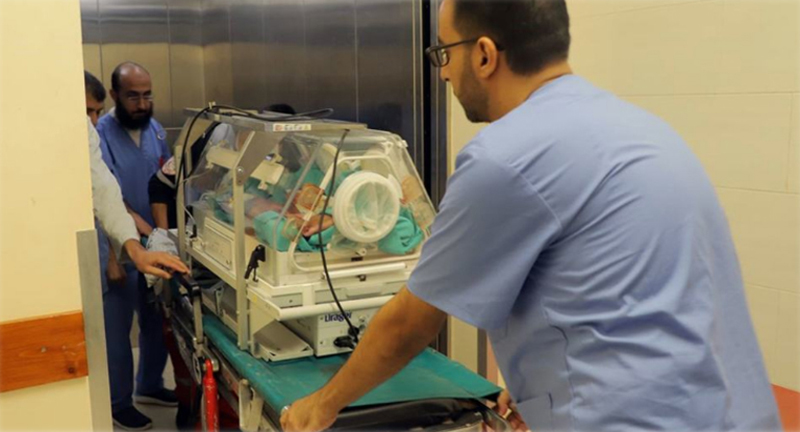Gaza crisis: aid agencies warn of ‘tragic, avoidable surge’ in child deaths

UN agencies on Tuesday issued an urgent call for action, emphasizing the severe health risks faced by pregnant women, babies and children due to worsening climate catastrophes.
In Protecting maternal, newborn and child health from the impacts of climate change, the World Health Organization (WHO), UN Population Fund (UNFPA), and UN Children’s Fund (UNICEF) jointly underscore the neglect, underreporting, and underestimation of climate events’ effects on maternal and child health.
It also draws attention to the importance of integrating maternal or child health in national climate change response plans given the gap in addressing the needs of women, newborns, and children in the climate change discourse in many countries.
Climate action now
“Climate change poses an existential threat to all of us, but pregnant women, babies and children face some of the gravest consequences of all,” warned Bruce Aylward, Assistant Director General for Universal Health Coverage at WHO.
“Children’s futures need to be consciously protected, which means taking climate action now for the sake of their health and survival, while ensuring their unique needs are recognized in the climate response,” he added.
The call to action, issued ahead of the COP28 climate conference, outlines seven urgent measures, including sustained reductions in greenhouse gas emissions, climate finance actions, and specific inclusion of the needs of pregnant women, babies, and children in policies.
Dire impacts
Amidst a year marked by devastating climate disasters, including wildfires, floods, heatwaves, and droughts, the impacts on pregnant women and children are dire.
Higher temperatures globally also contributes to the spread of deadly diseases, particularly affecting pregnant women and children.
Research indicates that harm can start in the womb, leading to various complications for both mothers and children, with consequences lasting a lifetime.
Arrival of medical staff and equipment
Speaking later in New York, UN Deputy Spokesperson Farhan Haq said around 40 trucks carrying medical equipment, alongside 180 doctors and nurses, entered Gaza on Monday for the establishment of a second Jordanian field hospital in the southern city of Khan Younis. The facility will have 150 beds.
He also reported that the Indonesian Hospital in Beit Lahiya, northern Gaza, came under attack on Monday. Twelve people were reportedly killed, including patients and their companions, and many others were injured.
This marked the fifth time the hospital has been hit since the start of hostilities last month.
“Hospitals and medical personnel are specifically protected under international humanitarian law and all parties to the conflict must ensure their protection. Hospitals must not be used to shield military objectives from attack,” he said.
The UN agency that assists Palestine refugees, UNRWA, further reported that nearly 93,000 displaced people are sheltering in 156 of its facilities across all five governorates in the Gaza Strip, including in the north.
UN at the ready
Meanwhile, international media have been reporting on the possibility of a deal between Israel and Hamas that would involve a hostage exchange and a cessation of fighting for four or five days.
Asked about UN humanitarian response in the event of a possible ceasefire, Mr. Haq said it was “a little bit premature” to talk about the issue.
“But certainly, what we are doing is trying to make sure that we are ready, so if there is any pause in fighting, which is what we've been asking for, we would be able to deliver humanitarian aid more effectively,” he said.
WHO staff member killed
The World Health Organization (WHO) mourned the death of a staff member who was killed in Gaza on Tuesday.
Dima Abdullatif Mohammed Alhaj, 29, worked as a patient administrator at the Limb Reconstruction Centre, a critical part of the WHO Trauma and Emergency Team, and had been with the UN agency since December 2019.
Alhaj had evacuated from Gaza City to her parents’ house in the south, which was bombed on Tuesday.
She was killed alongside her husband, six-month old son, and two of her brothers. Reportedly, over 50 family and community members sheltering in the same house also died.
"She was a wonderful person with a radiant smile, cheerful, positive, respectful. She was a true team player. Her work was crucial, and she had been requested to take on even more responsibilities to support the Gaza sub-office and team,” said Dr. Rik Peeperkorn, WHO representative in the occupied Palestinian territory.
He expressed deepest condolences to her mother and father, a long-serving medical specialist in Gaza, as well as to her family and many friends.
WHO noted that the humanitarian community and the UN have suffered losses since the start of the conflict. Two doctors from the medical charity MSF were also killed on Tuesday while UNRWA has lost 108 colleagues to date.
“The death of Dima and her family is another example of the senseless loss in this conflict,” said WHO. “We plead again with all those who hold in their hands the power to end this conflict to do so.”



